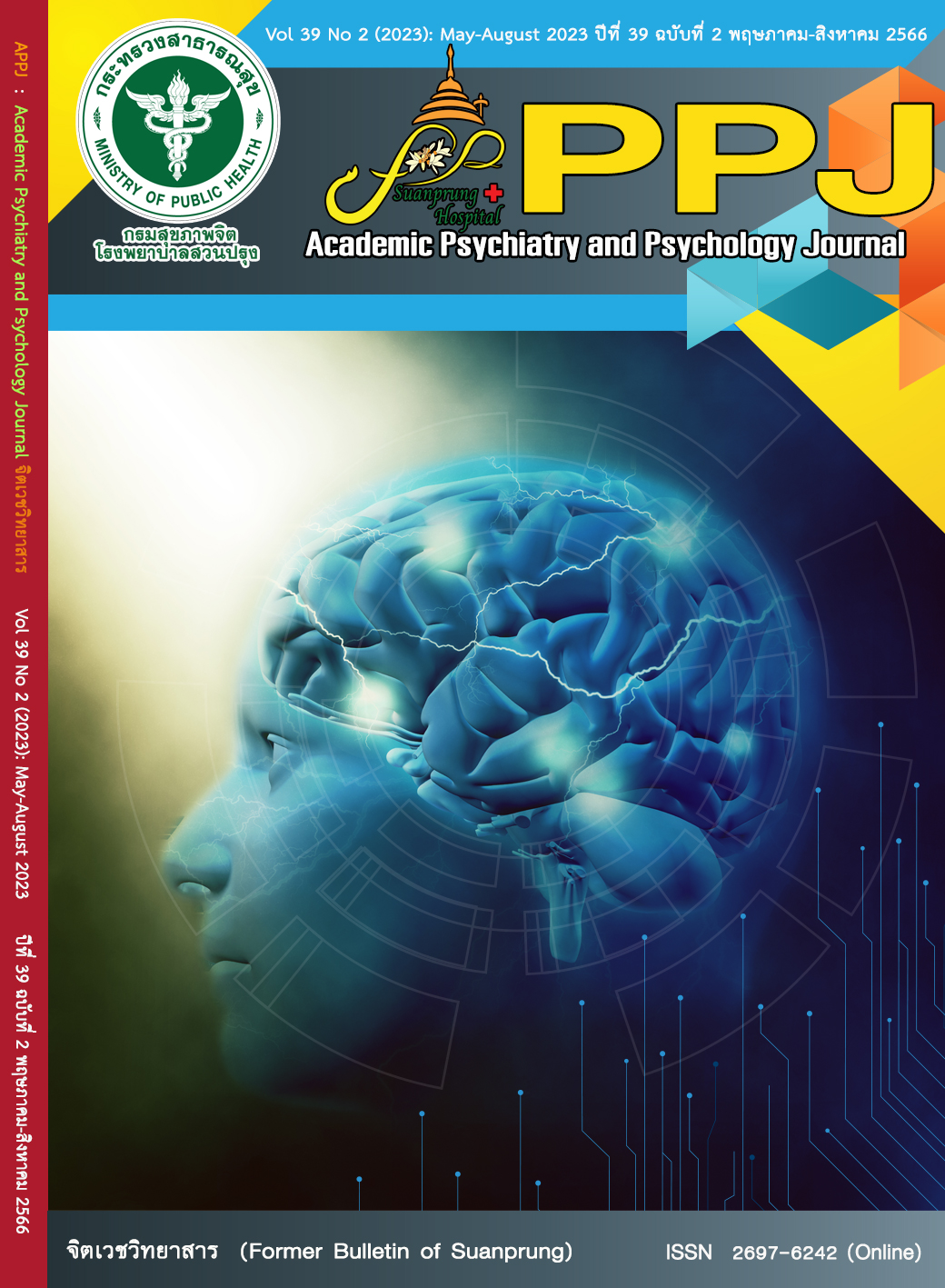The Effects of Resilience Enhancing Program on Psychological Well-Being among Nursing Students
Main Article Content
Abstract
Objective: This study aimed to test the effects of a resilience-enhancing program on psychological well-being among nursing students.
Materials and methods: The sample of this quasi-experimental research consisted of 62 first-year nursing students in Boromarajonani College of Nursing, Phra-Phutthabat, who met the inclusion criteria. They were randomly selected and were equally divided into an experimental group (n=31) and a control group (n=31). The research instruments included the demographic data form, the psychological well-being inventory, and the Resilience Enhancing Program. The data collection was conducted from May to August, 2022. Descriptive statistics, independent t-test, two-way repeated measure ANOVA, and multiple comparisons by Bonferroni were employed to analyze the data.
Results: The results revealed that the experimental group had statistically significantly higher mean scores of psychological well-being than the control group at the posttest (p<.01) and one-month follow-up period (p<.001). Within the experimental group, mean scores of psychological well-being at the pretest, posttest, and one-month follow-up period were significantly different (p<.001).
Conclusions: The resilience-enhancing program was effective at increasing the psychological well-being of nursing students.
Article Details

This work is licensed under a Creative Commons Attribution-NonCommercial-NoDerivatives 4.0 International License.
บทความหลังผ่านการปรับแก้จากกองบรรณาธิการแล้ว เป็นลิขสิทธ์ของวารสารจิตเวชวิทยาสาร โรงพยาบาลสวนปรุง กรมสุขภาพจิต กระทรวงสาธารณสุข ห้ามเผยแพร่เพื่อประโยชน์ทางการค้าโดยไม่ได้รับอนุญาต แต่อนุญาตให้เผยแพร่บทความดังกล่าวเพื่อประโยชน์ทางการศึกษาแก่ประชาชนทั่วไป ทั้งนี้กองบรรณาธิการไม่จำเป็นต้องเห็นด้วยกับบทความหรือข้อคิดเห็นใดๆ ที่ปรากฏในวารสารสวนปรุง
References
Kaewmart N, Koedbangkham J, Nabkasorn C. Factors Influencing Depression among Nursing Students of Burapha University. The Journal of Faculty of Nursing Burapha University 2011;19(Suppl.2):83-95. (in Thai)
Tongkeo T. New Normal Based Design in Education: Impact of COVID-19. Journal of Teacher Professional Development 2020;1(2):1-10. (in Thai)
Alici NK, Copur EO. Anxiety and fear of COVID‐19 among nursing students during the COVID‐19 pandemic: A descriptive correlation study. Perspectives in Psychiatric Care 2021:58(1);141-8. https://doi: 10.1111/ppc.12851.
Majrashi A, Khalil A, Nagshabandi EA, Majrashi A. Stressors and Coping Strategiesamong Nursing Students during the COVID-19 Pandemic: Scoping Review.Nursing Report 2021;11:444-59. https://doi.org/10.3390/nursrep11020042.
Moawad RA. Online learning during the COVID-19 pandemic and academic stress in university students. Revista Romaneasca Pentru Educatie Multidimensionala 2020;12(1):100-7.
Ryff CD, Keyes CLM. The Structure of Psychological Well-Being Revisited. Journal of Personality and Social Psychology 1995;69(4):719-27.
Ratanasiripong P, Wang CD. Psychological well-being of Thai nursing students.Nurse Educ Today 2011;31(4):412-6.
Al-Ani ASR. Psychological Well-Being among Nursing Students. IIUM Medical Journal Malaysia 2020;18(2). https://doi.org/10.31436/imjm.v18i2.571.
He FX, Turnbull B, Kirshbaum MN, Phillips B, Klainin-Yobas, P. Assessing stress, protective factors and psychological well-being among undergraduate nursing students. Nurse Educ Today 2018;68:4-12.
Smith GD, Yang F. Stress, resilience and psychological well-being in Chinese undergraduate nursing students. Nurse Edu Today 2017;49:90-5.https://doi: 10.1016/j.nedt.2016.10.004.
Lee H, Seo K. Factors Associated with Psychological Well-being among Korean Nursing students. Indian Journal of Public Health Research & Development 2019;10(11):4550-6.
Grotberg EH. A guide to promoting resilience in children: Strengthening the human spirit. The Hague: The Bernard van Leer Foundation; 1995.
Saengkhiew P, Khiaolueang D, Srijaiwong S, Tantalanukul S, Chomkarn P. Resilience and Adaptation of Nursing Students in the COVID-19 Pandemic Boromarajonani College of Nursing Uttaradit. Boromarajonani College of Nursing, Uttaradit Journal 2022;14(1):62-77. (in Thai)
Li ZS, Hasson F. Resilience, stress, and psychological well-being in nursing students:A systematic review. Nurse Educ Today 2020;90:104440.https://doi.org/10.1016/j.nedt.2020.104440.
Jirathikrengkrai C, Vongsirimas N, Thanoi W, Phetrasuwan S. Factors in Predicting Psychological Well-being in Late Adolescents. Nurs Sci J Thail 2021;39(2):77-89. (in Thai)
Cohen J. Statistical power analysis for the behavioral science. New York: Lawrence Erlbaum Associates; 1988.
Faul F, Erdfelder E, Lang AG, Buchner A. G*Power 3: A flexible statistical power analysis program for the social, behavioral, and biomedical sciences. Behavior Research Methods 2007;39:175-91.
Patikorn P. Psychological Well-Being, Positive Thinking, Self-Directed Learning and Prosocial Behavior of Undergraduate Students in Kasetsart University [Master thesis]. Bangkok: Kasetsart University; 2011. (in Thai)
Grotberg EH. Resilience for today: gaining strength from adversities. Connecticut: Praeger; 2003.
Helmreich I, Kunzler A, Chmitorz A, König J, Binder H, Wessa M, Lieb K. Psychological interventions for resilience enhancement in adults. Cochrane Database of Systematic Reviews 2017;2:CD012527. https://doi.org/10.1002/14651858.CD012527.
Joyce S, Shand F, Tighe J, Laurent SJ, Bryant RA, Harvey SB. Road to resilience:A systematic review and meta-analysis of resilience training programmes and interventions. BMJ Open 2018;8(6):e017858. http://dx.doi.org/10.1136/bmjopen-2017-017858.
Panyawan I, Narkpongphun A. The effectiveness of mental health promotion program on resilience quotient of nursing staff. Academic Psychiatry and Psychology Journal 2020;36(3):236-45. (in Thai)

